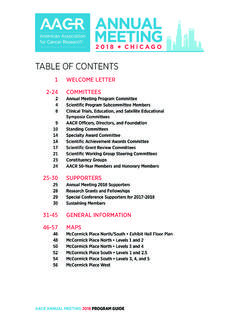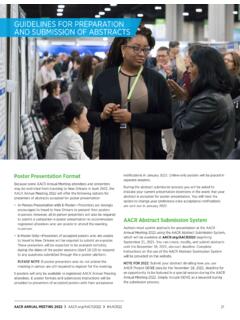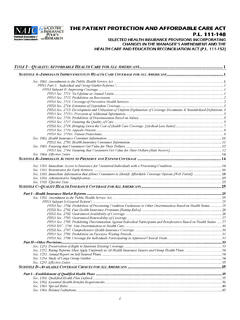Transcription of 2018 AACR Scholar-in-Training Awards
1 2018 Annual Meeting Scholar-in-Training Awards The AACR is proud to offer Scholar-in-Training Awards to enable the participation of meritorious early-career scientists at the Annual Meeting 2018 . Since its inception in 1986, the AACR Annual Meeting Scholar-in-Training Award program has provided more than 4,500 grants to young investigators and has received support from more than 55 cancer research foundations, corporations, individuals and other organizations dedicated to the fight against cancer. This year, 21 organizations or individuals generously provided the funding to support this program. The names and affiliations of the 2018 Scholar-in-Training Award recipients, along with the abstract numbers and titles of their abstracts, are listed below. 2018 AACR Scholar-in-Training Awards AACR has graciously both donated and distributed funds received to support early-career investigators who will be presenting meritorious abstracts at the AACR Annual Meeting 2018 .
2 Yashar S. Niknafs, PhD, University of Michigan, Ann Arbor, MI. Abstract 4982. Oncogenic role of THOR, a conserved cancer/testis long noncoding RNA. Mellissa J. Nixon, PhD, Vanderbilt University, Nashville, TN. Abstract 2982. Somatic TP53 mutations alter the immune microenvironment after chemotherapy in breast cancer. Hitoshi Ohtani, PhD, Van Andel Research Institute, Grand Rapids, MI. Abstract 2993. A switch in epigenetic silencing mechanisms of endogenous retroviruses during human genome evolution. Ethel R. Pereira, PhD, Massachusetts General Hospital/Harvard Medical School, Boston, MA. Abstract 3022. Lymph node metastasis in solid tumors: A marker or driver of disease progression? Brian J. Abraham, PhD, MIT Whitehead Institute for Biomedical Research, Cambridge, MA. Abstract 971. Three-dimensional gene regulatory landscapes in normal and cancer cells.
3 Mustafa M. Basree, MS, Kentucky College of Osteopathic Medicine, Pikeville, KY. Abstract 2242. Breastfeeding protects against pro-tumorigenic changes in the mammary gland by limiting epithelial luminal progenitor cell expansion. Roman Camarda, BS, University of California San Francisco, San Francisco, CA. Abstract 2398. Tumor cell-adipocyte gap junctions activate lipolysis in breast cancer. Valerio Embrione, MS, The Ohio State University, Columbus, OH. Abstract 476. A human scFv as a tool to understand the biogenesis of a subset of oncogenic microRNAs. Merit L. Goodman, BS, University of Kansas Medical Center, Kansas City, KS. Abstract 1800. Progesterone receptor attenuates STAT1-mediated interferon signaling in breast cancer. Robert Gueth, PhD, New Mexico State University, Las Cruces, NM; California State University, Northridge, CA.
4 Abstract 4998. Targeting DHPS to abrogate TGF -induced metastasis in breast cancer. Peter C. Hart, PhD, University of Chicago, Chicago, IL. Abstract 5474. Activity of the S1P pathway promotes ovarian cancer and serves as a novel metabolic target of metformin. Sisi He, MS, University of Illinois Urbana-Champaign, Champaign, IL. Abstract 199. Host CYP27A1 expression is essential for ovarian cancer progression. Lauren M. Hurwitz, MHS, Johns Hopkins Bloomberg School of Public Health, Baltimore, MD. Abstract 4947. Aspirin use and risk of lethal prostate cancer in the Atherosclerosis Risk in Communities cohort. Lauren Jin Suk Joo, BS, Kolling Institute of Medial Research, The University of Sydney, St. Leonards, NSW, Australia. Abstract 501. A RET-related microRNA, miR-153-3p, acts as a tumor suppressor in medullary thyroid carcinoma (MTC) via S6K signaling.
5 Aaron B. Koenig, MS, The Ohio State University College of Medicine, Columbus, OH. Abstract 5400. A comprehensive analysis of the interactome of miR-21, an established oncomir, by Argonaute-CLIP analysis identifies novel conserved and species-specific targets of miR-21 in human liver and hepatocellular carcinoma. Dragomir B. Krastev, PhD, Institute of Cancer Research, London, United Kingdom. Abstract 1360. A PARylation biosensor genetic screen to identify novel PARylation targets. Steve Seung-Young Lee, PhD, The University of Chicago, Chicago, IL. Abstract 3032. Quantitative three-dimensional imaging cytometry of tumor immune microenvironment. Kah Suan Lim, PhD, Dana-Farber Cancer Institute, Boston, MA. Abstract 333. USP1 is required for replication fork stability in BRCA1-deficient tumors. Evan C. Markegard, BS, UCSF Helen Diller Family Comprehensive Cancer Center, San Francisco, CA.
6 Abstract 5520. Oncogenic RTK signaling inhibits Spred1/NF1 to sustain constitutive Ras/MAPK signaling. Kevin C. Miller, BS, Mayo Clinic, Rochester, MN. Abstract 3909. HDAC inhibition in combination with MEK or BCL-2 inhibition as novel therapeutic strategies in multiple myeloma. Stephen Mok, PhD, The University of Texas MD Anderson Cancer Center, Houston, TX. Abstract 2984. Effects of anti-CTLA-4 and anti-PD-1 on memory T-cell differentiation and resistance to tumor relapse. Alexander H. Morrison, BA, University of Pennsylvania, Philadelphia, PA. Abstract 4940. Nonredundant roles for immune checkpoint blockade and agonistic CD40 in mediating T-cell responses in pancreatic ductal adenocarcinoma. Tarek H. Mouhieddine, MD, Dana-Farber Cancer Institute, Boston, MA. Abstract 2954. Immunomodulator maintenance post autologous stem cell transplant predicts better outcome in multiple myeloma patients with clonal hematopoiesis of indeterminate potential.
7 Nethaji Muniraj, PhD, Johns Hopkins Sidney Kimmel Comprehensive Cancer Center, Baltimore, MD. Abstract 1335. Withaferin A induces nonprotective autophagy in a STK11-independent manner and mediates breast cancer inhibition via energetic impairment. Manali S. Phadke, PhD, Moffitt Cancer Center, Tampa, FL. Abstract 3973. Dabrafenib suppresses the growth of BRAF-WT cancers through inhibition of novel targets Nek9 and Cdk16. Evanthia T. Roussos Torres, MD, PhD, Johns Hopkins University, Baltimore, MD. Abstract 4965. Entinostat transforms the suppressive tumor microenvironment of breast cancer and promotes survival and anti-responses when combined with checkpoint inhibition. Madhav Sankunny, PhD, Cleveland Clinic Foundation, Cleveland, OH. Abstract 317. Role of KLLN in DNA damage-induced apoptosis is associated with the regulation of p53 phosphorylation and acetylation in breast cancer cells.
8 Steven D. Scoville, PhD, The Ohio State University, Columbus, OH. Abstract 4729. The aryl hydrocarbon receptor directly regulates microRNA-29b to inhibit human natural killer cell development and function in acute myeloid leukemia. Xiang Shu, PhD, Vanderbilt University Medical Center, Nashville, TN. Abstract 3222. Evaluation of associations between circulating proteins and breast cancer risk using genetic variants. Vindhya Vijay, MS, University of Florida, Gainesville, FL. Abstract 4955. Heterogeneous nuclear ribonucleoprotein C as a novel therapeutic target for acute myeloid leukemia. 2018 AACR- American Brain Tumor Association Scholar-in-Training Awards The American Brain Tumor Association has graciously donated funds to support young investigators who will be presenting high-quality abstracts in brain cancer research for both primary and secondary (metastatic) brain tumors at the AACR Annual Meeting 2018 .
9 Damian A. Almiron Bonnin, BA, Geisel School of Medicine at Dartmouth, Hanover, NH. Abstract 141. HEY1-mediated inhibition of glioma stem cell proliferation is associated with restoration of glioma stem cell division asymmetry and transcriptional repression of PDGFRA. Samirkumar B. Amin, MBBS, PhD, The Jackson Laboratory for Genomic Medicine, Farmington, CT. Abstract 1176. Genomic profiling of canine glioma: Comparative analyses with respect to drivers of human glioma. Peiwen Chen, PhD, The University of Texas MD Anderson Cancer Center, Houston, TX. Abstract 117. Lysyl oxidase secreted by PTEN-deficient glioblastoma cells recruits macrophages and promotes malignant growth. Islam Hassan, MD, The University of Texas MD Anderson Cancer Center, Houston, TX. Abstract 2955. A radiomic-based MRI phenotype is uniquely associated with hypermutated genotype in gliomas.
10 Mohammad Belayat Hossain, PhD, The University of Texas MD Anderson Cancer Center, Houston, TX. Abstract 3205. Histone tyrosine phosphorylation determines glioblastoma cell survival. Yunpeng Liu, MS, Massachusetts Institute of Technology, Cambridge, MA. Abstract 928. Regulatory heterogeneity in glioblastoma multiforme informs novel drug target discovery. 2017 AACR-Aflac, Inc. Scholar-in-Training Awards Support for AACR Scholar-in-Training Awards is part of Aflac s generous support of activities for early-career scientists within the AACR. These Awards support early-career investigators who will be presenting meritorious abstracts at the AACR Annual Meeting 2018 . Kristin G. Anderson, PhD, Fred Hutchinson Cancer Research Center and the University of Washington, Seattle, WA. Abstract 2555. Engineering adoptive T cell therapy to co-opt Fas ligand-mediated death signaling in solid tumors.





